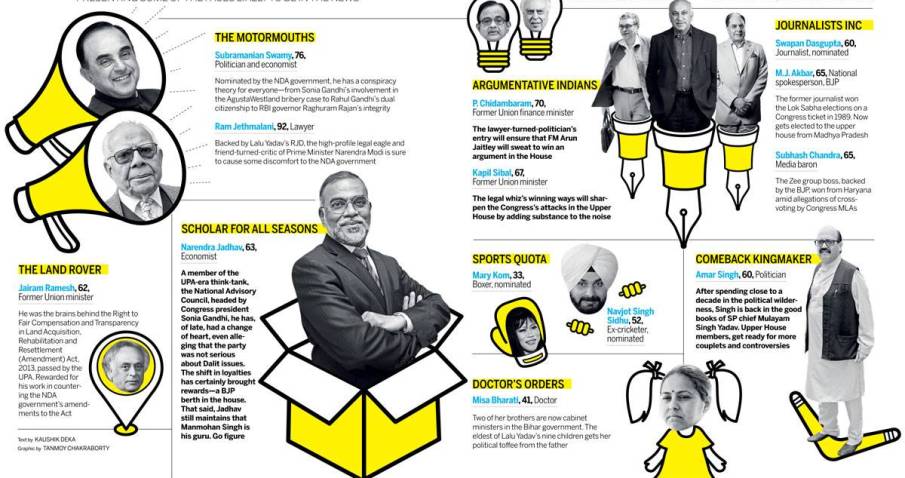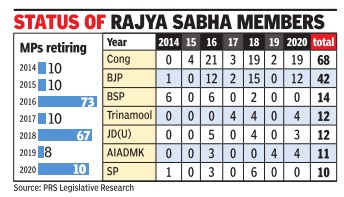Rajya Sabha
(→Party positions) |
(→Deputy Chairman ) |
||
| Line 41: | Line 41: | ||
While BJP now has its nominees as President, Vice-President and Lok Sabha Speaker, the RS deputy chairman is with an ally. The successful vote also delivered the benefit of strengthening the political alliance with the Janata Dal (United) in Bihar where the party has been at odds with BJP on several issues, the most contentious being seat-sharing for the Lok Sabha polls. | While BJP now has its nominees as President, Vice-President and Lok Sabha Speaker, the RS deputy chairman is with an ally. The successful vote also delivered the benefit of strengthening the political alliance with the Janata Dal (United) in Bihar where the party has been at odds with BJP on several issues, the most contentious being seat-sharing for the Lok Sabha polls. | ||
JD(U) has been insisting on power-sharing and early settlement of seat division for the Lok Sabha polls. Cooperation for the Rajya Sabha post indicates that the two sides are ready to sort out claims, complicated by JD(U) having just two sitting MPs but having won many more seats in the state assembly elections. JD(U) is not represented in the Union Cabinet. | JD(U) has been insisting on power-sharing and early settlement of seat division for the Lok Sabha polls. Cooperation for the Rajya Sabha post indicates that the two sides are ready to sort out claims, complicated by JD(U) having just two sitting MPs but having won many more seats in the state assembly elections. JD(U) is not represented in the Union Cabinet. | ||
| + | |||
| + | =Debates= | ||
| + | == Bills passed with little or no debate == | ||
| + | ===2007-14=== | ||
| + | [https://epaper.timesgroup.com/Olive/ODN/TimesOfIndia/shared/ShowArticle.aspx?doc=TOIDEL%2F2020%2F09%2F24&entity=Ar01114&sk=42BFA836&mode=text ‘RS passed 16 bills with little or no debate during UPA era’, September 24, 2020: ''The Times of India''] | ||
| + | |||
| + | |||
| + | Rajya Sabha passed at least 16 bills with no debate or as little as over one minute during UPA’s tenure, sources in Rajya Sabha said. | ||
| + | |||
| + | For instance, on December 23, 2008, Rajya Sabha passed the Scheduled Castes and Scheduled Tribes (Reservations in Posts and Services) Bill in just one minute. It was passed in the din without discussion or debate. The Appropriation (Railways) No 5 Bill, 2008, and IT (Amendment) Bill, 2008 were also passed on the same day, in one minute each. These bills were among 16 legislations, passed by the upper House between September 2007 and February 2014 when UPA government was in power, in which the time taken to pass the bills ranged from just one minute to a little over three hours, sources said. | ||
| + | |||
| + | In September 2007, legislations like the Competition (Amendment) bill, was passed amid din in two minutes. | ||
| + | |||
| + | [[Category:Government|R RAJYA SABHARAJYA SABHARAJYA SABHA | ||
| + | RAJYA SABHA]] | ||
| + | [[Category:India|R RAJYA SABHARAJYA SABHARAJYA SABHA | ||
| + | RAJYA SABHA]] | ||
| + | [[Category:Politics|R RAJYA SABHARAJYA SABHARAJYA SABHA | ||
| + | RAJYA SABHA]] | ||
=Election of MPs= | =Election of MPs= | ||
Revision as of 15:22, 8 October 2020
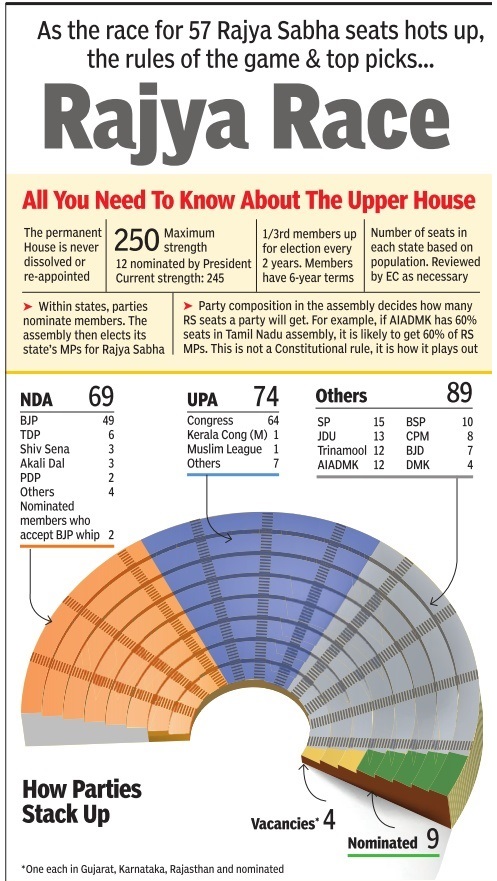
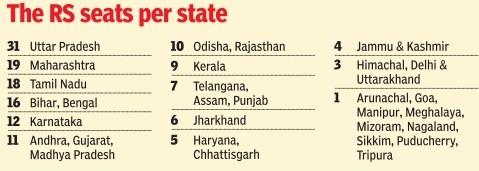
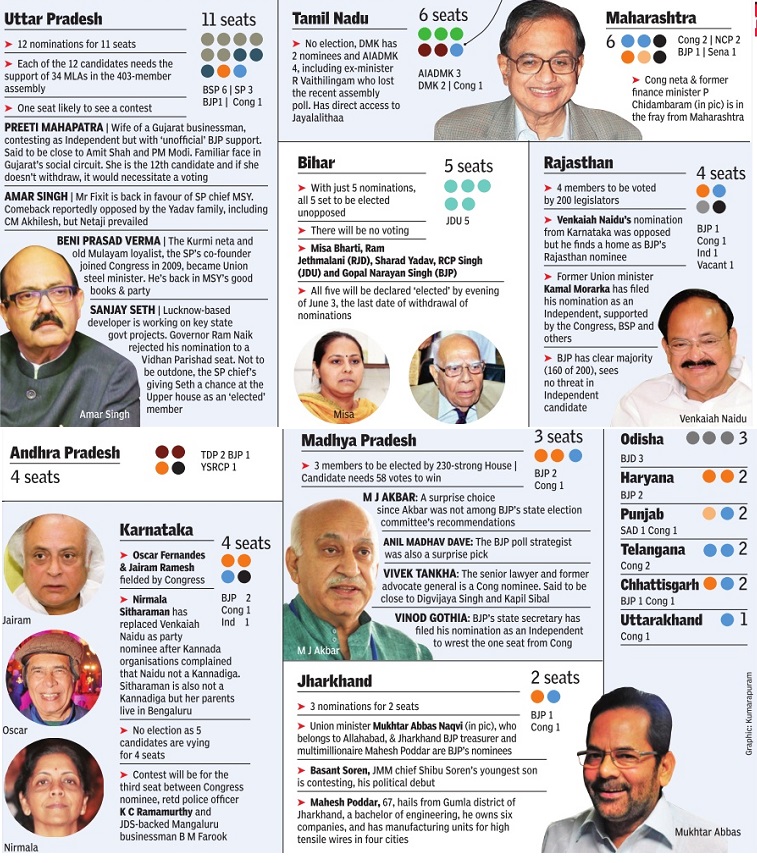
This is a collection of articles archived for the excellence of their content. |
Contents |
Deputy Chairman
2018: NDA’s Harivansh wins
Akhilesh Singh, August 10, 2018: The Times of India
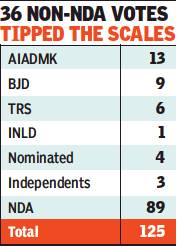
From: Akhilesh Singh, August 10, 2018: The Times of India
The opposition lost the perception battle over the election of the Rajya Sabha deputy chairman with NDA nominee and JD(U) MP Harivansh winning comfortably with 125 votes in his favour while Congress candidate B K Hariprasad polled 101, less than his full quota of votes.
While all NDA votes, along with those of regional parties AIADMK and BJD, were in order, with the addition of Ram Jethmalani, representing RJD, and the lone INLD MP Ram Kumar Kashyap taking the tally to 125, there were as many as 18 absences and abstentions from the opposition.
Three MPs each from Congress and SP and two from Trinamool did not turn up. DMK ranks were depleted too despite two MPs being brought to the capital by chartered flight. Out of the effective strength of 244 members, 226 cast their votes as Jagan Mohan Reddy’s YSRCP (2) abstained and AAP (3), PDP (2) and NPF (1) were absent.
After no-trust, 2nd big win for govt
The result was a setback for Congress, which had forced the showdown after regional parties in the opposition decided not to field a candidate. Congress said the decision to contest should be read in the context of its view that opposition to the Modi government’s policies had to be registered. However, gaps in the opposition benches were a blow to claims of a united front against BJP and the win also helped the party claim that the opposition’s stranglehold over the Upper House had been breached.
Prime Minister Narendra Modi congratulated Harivansh, dwelling on his career as a journalist and author, and described him as a “well-read” person who “has written a lot”. “He has served society for years,” the PM said in the Rajya Sabha after the result was announced.
This was the second instance in recent weeks that the government has managed to ward off an opposition challenge, having won the no-confidence motion with a 300-plus vote in the Lok Sabha despite the lastminute absence by the Shiv Sena with AIADMK’s 37 MPs more than making up the difference. The Rajya Sabha election hung on the BJD’s stance and the Odisha outfit backed Harivansh with its nine MPs. The party had stayed away from the no-confidence motion.
While BJP now has its nominees as President, Vice-President and Lok Sabha Speaker, the RS deputy chairman is with an ally. The successful vote also delivered the benefit of strengthening the political alliance with the Janata Dal (United) in Bihar where the party has been at odds with BJP on several issues, the most contentious being seat-sharing for the Lok Sabha polls. JD(U) has been insisting on power-sharing and early settlement of seat division for the Lok Sabha polls. Cooperation for the Rajya Sabha post indicates that the two sides are ready to sort out claims, complicated by JD(U) having just two sitting MPs but having won many more seats in the state assembly elections. JD(U) is not represented in the Union Cabinet.
Debates
Bills passed with little or no debate
2007-14
‘RS passed 16 bills with little or no debate during UPA era’, September 24, 2020: The Times of India
Rajya Sabha passed at least 16 bills with no debate or as little as over one minute during UPA’s tenure, sources in Rajya Sabha said.
For instance, on December 23, 2008, Rajya Sabha passed the Scheduled Castes and Scheduled Tribes (Reservations in Posts and Services) Bill in just one minute. It was passed in the din without discussion or debate. The Appropriation (Railways) No 5 Bill, 2008, and IT (Amendment) Bill, 2008 were also passed on the same day, in one minute each. These bills were among 16 legislations, passed by the upper House between September 2007 and February 2014 when UPA government was in power, in which the time taken to pass the bills ranged from just one minute to a little over three hours, sources said.
In September 2007, legislations like the Competition (Amendment) bill, was passed amid din in two minutes.
Election of MPs
Secret ballot and cross-voting: a backgrounder
The Constituent Assembly took a policy decision on July 28, 1947 that the Federal Parliament shall consist of two chambers. The Council of States, or the Upper House, took birth on April 3, 1952 and held its first sitting on May 13, 1952. It was rechristened as ‘Rajya Sabha’ on August 23, 1954. RS was created to bring into Parliament the experienced and seasoned men of integrity and achievement, without subjecting them to din and bustle of general elections, to enhance quality of debates and legislations.
Not many years later, indirect elections to Rajya Sabha got mired in controversy, and there were talks about money and muscle power having a significant play in influencing the voting through secret ballot. Senior Congress MP Bibhuti Mishra introduced a Private Member’s Bill in Lok Sabha on March 30, 1973 for abolition of Rajya Sabha on ground that elections to RS have been mired in corruption.
Everyone knew at that time how the secret ballot was an open invitation for corruption during voting to elect a Rajaya Sabha member. However, the attempt to introduce the Bill for abolition of RS drew adverse public opinion and the leaders in Parliament referred the issue to Ethics Committee of Parliament headed by S B Chavan.
The Committee report, adopted on December 15, 1999, made startling findings. “The Committee has also noted the emerging trend of cross-voting in the elections for Rajya Sabha and the Legislative Councils in States. It is often alleged that large sums of money and other considerations encourage the electorate for these two bodies to vote in a particular manner leading
sometimes to the defeat of the official candidates belonging to their own political party. In order not to allow big money and other considerations to play mischief with the electoral process, the Committee is of the view that instead of secret ballot, the question of holding the elections to Rajya Sabha and the Legislative Councils in States by open ballot may be examined.”
The feeling of the political parties, whose members in Parliament, over cross voting in RS polls was best described by Griffith and Ryle in “Parliamentary Functions, Practice and Procedures”, in which they said: “To abstain from voting when required by party to vote is to suggest a degree of unreliability. To vote against party is disloyalty. To join with others in abstention, or voting with the other side, smacks of conspiracy.”
A case in point: Liquor baron Vijay Mallya got elected to Rajya Sabha in 2002 as an independent from Karnataka with support of Congress and Janata Dal (Secular). He had joined Subramanian Swamy-led Janata Party and was later appointed as working President. He was removed from the post by Swamy after Mallya got elected again to Rajya Sabha in 2010, this time with the backing of BJP and JD(S).
The NDA government successfully pushed a Bill for amendment of Representation of People Act and brought in ‘Open Ballot” system. The effect of this was that before a MP or a MLA inserts the ballot paper into the ballot box, authorized agents of the political party shall be allowed to verify whom s/he voted for. If s/he refuses to show the ballot paper, the same shall be invalidated, thus compelling her/him to show it to the authorized agent of the party.
This ‘Open’ ballot process was challenged in SC by Kuldip Nayar alleging that it stifled free speech and expression of a voter, which is at the core of democracy. A five-judge bench led by then CJI Y K Sabharwal unanimously upheld the constitutional validity of the ‘open ballot’ system on August 22, 2006 and said: “if secrecy becomes a source for corruption, then sunlight and transparency have the capacity to remove it.”
It said: “Voting in elections to Council of States cannot be compared with a general election. In a general election, the elector have to vote in a secret manner without fear that their votes would be disclosed to anyone or would result in victimization. There is no party affiliation and hence the choice is entirely with voter. This is not the case when elections are held to the Council of States as the electors are elected members of the legislative assemblies who in turn have affiliations.”
To deal with money and muscle power engineering splits in political parties and defections, parliament had enacted anti-defection law to combat this political evil.
This provided for disqualification of an MP or MLA if s/he “votes or abstains from voting” contrary to the directions of her/his party. The long and short of it was that a MP or a MLA cannot do conscience voting, only permitted during Presidential elections, in Parliament over any issue.
However, the anti-defection law is not applicable to RS elections.
If parliamentarians thought, they will name and shame those MPs and MLAs who cross-vote despite ‘open ballot’ system, then their hopes have been belied. The recent Rajaya sabha elections and the manner in which cross-voting happened in Uttar Pradesh , Jharkhand and Karnataka would have dawned a realization on many that, the voters in such elections have successfully defied both the secret and open ballot systems.
Defiance against party line has happened in other countries too: In United Kingdom we saw this over Brexit and in US over healthcare Bill. But, in India, Rajya Sabha elections continue to be an incurable enigma.
Dispute in 2017
CEC went by rulebook to invalidate two votes, August 10, 2017: The Times of India
The entire Gujarat bureaucracy was talking animatedly about how Chief Election Commissioner Achal Kumar Joti mustered the courage to defy BJP by invalidating the votes of two rebel Congress legislators.
Gujarat bureaucrats, who have worked with Joti or known him, weren't surprised. They said Joti, a soft-spoken and conservative academic, is a stickler for rules. A 1975 batch IAS officer of Gujarat cadre, he had also served as Gujarat chief secretary .
When Congress demanded invalidation of two votes cast in BJP's favour in the Rajya Sabha polls, Joti's junior colleagues in Gandhinagar knew that the results were unlikely to be announced before midnight. Because Joti “will go by every word in the rule book,“ said a senior IAS officer who had worked with him for 17 years. When TOI asked Chief Election Commissioner Achal Kumar Joti about how he had resolved Tuesday's tangle related to Gujarat's Rajya Sabha election results, he said, “We took the legal position after examining the complaint, listening to delegations of both the parties, considering the returning officer's report, and watching video records. We then decided to invalidate the two votes.“
He added that before invalidating the votes, the EC had gone through the legal provisions and previous circulars issued on similar matters. On Tuesday , even as the tense drama was on, Joti's colleagues were intrigued by the rumour that the CEC may have consulted the PMO before going by the rule book.
Joti's decision has been subject to various interpretations. One view is that the EC had no option in the face of video evidence.
A voter showing his ballot to a person other than the authorised polling agent was clearly a violation of the secret ballot rule.
Earlier in July this year, a spate of resignations by Congress MLAs had left the party with few options and Ahmed Patel's defeat seemed inevitable. It may be recalled that some Congress MLAs had voted for NDA candidate Ram Nath Kovind even in the presidential election. Hence, this time, the Congress was better prepared to counter BJP's plans. During the dispute over validity of two votes, the BJP had put forward four sets of arguments before the Election Commission (EC) of India, all of which were rejected one by one in the final order issued by the EC on Tuesday night. The first submission was that the secrecy of ballot principle did not apply to a vote in elections to the Rajya Sabha. The BJP argued that once the vote is revealed, even if only to the authorised party agent, the vote no longer remains secret.
The EC however rejected this argument saying that open ballot only meant that the vote was to be shown to the party agent and none other.
Secondly , the BJP argued that the nowhere did Section 39AA of Conduct of Election Rules prefix `only' with the `authorised party agent'. The rea soning behind is that unless expressly stated in the rules that `only' the agent can be shown the vote, it was perfectly valid to show it to others.
The BJP's third contention was that the EC's jurisdiction ended after the ballot had been cast and inserted in the ballot box. Beyond this point, only the high court could intervene, the party had claimed.But the EC disagreed saying that its sweeping powers of superintendence over elections extend right up to the declaration of results.
Fourth, the BJP questioned as to why the returning officer or authorised party agent had not found anything amiss when the ballot was being cast and raised the matter only later when it was apparent that the Congress did not have the requisite numbers.The EC, however, said it had the final word on disputes regarding conduct of elections and that the returning officer was required to get a go-ahead from EC, first to start the counting and finally for declaration of the results.
Joti, a 1975 batch IAS officer, served in various capacities in Gujarat, including as chairman, Kandla Port Trust (KPT) between 1999 and 2004.He is given the credit for putting the KPT back on track in just 21 days after the 2001 earthquake and after a cyclone. “He knew most junior engineers and even peons by name. In fact, anyone could walk into his office and discuss with him,“ says a former retired KPT colleague.
Joti has also served as chairman of Gujarat State Petroleum Corp Ltd and Gujarat State Fertilizers & Chemicals Ltd. He was also a secretary of industry , revenue and water supply departments.Prior to becoming the Gujarat chief secretary in January 2010, Joti headed the Sardar Sarovar Narmada Nigam Ltd.After his retirement in January 2013, he served as Gujarat vigilance commissioner.
One of Joti's junior IAS colleagues recalls that in December 2009, Joti had come under the spotlight when CM Narendra Modi first indicated that he may make Joti the state's next chief secretary.Ignoring Balwant Singh, who was senior ACS (home) at the time, Modi had praised Joti for his “exemplary work“ by remaining in rural areas till late in the evening.
2018: poll-station layout changed
In order to ensure that legislators voting in an RS election show their marked ballot only to an authorised party representative, the EC has proposed a revised layout of the polling station that will provide the electors a ‘secure corridor’ to the ballot box.
The changed layout is aimed at avoiding a repeat of theconfusion that marked the election of senior Congress leader Ahmed Patel to the Rajya Sabha in August last year. Two Congress MLAs from Gujarat - Bhola Bhai Gohil and Raghavji Patel - had then violated the voting procedure by allegedly showing their marked ballot paper to persons other than the authorised party representative. The EC cancelled their votes on the ground of violation of voting norms.Patel finally emerged winner.
In a letter written tochief electoral officers of all states and UTs in December 2017, the EC shared details of the new proposed layout of polling station and sought their comments. If finalised, the new layout may be implemented in the polls to 59 Rajya Sabha seats in April.
As per the proposedlayout, an MLA will not have interface with any person other than the authorised party representative as he carries his marked ballottotheballotbox. Also, the layout will ensure uniformity in voting procedure followed in polling stations across the country. As per Rules 39A and 39AAof the Conduct of Election Rules, 1961, the marked ballot paper can only be shown by a voting MLA to the authorised representative of the political party to which he/she belongs.
2020 Elections
Swati Mathur, June 20, 2020: The Times of India
With 43 firsttime MPs set to enter Rajya Sabha after biennial elections, the House of Elders is likely to get younger. But the House will also end up losing about 63 terms worth of collective experience.
This is because 61 members who are due to retire from the Upper House in June have a total collective experience of 95 terms. In contrast, the new incumbents have a cumulative experience of 32 terms, resulting in a sharp decline in collective experience.
Against the 61 vacancies created by retiring members, while 42 were filled by MPs who were elected unopposed, elections to the remaining 19 vacancies were held.
The drop in the total experience in respect of four vacancies in Andhra Pradesh is six terms, followed by five terms in respect of six vacancies in Tamil Nadu, four terms in case of four vacancies in Gujarat and four terms in Odisha with all the four new members being first-timers.
The prominent first-timers entering the Upper House include BJP’s Jyotiraditya Scindia, Congress’ Mallikarjun Kharge and KC Venugopal, former Lok Sabha deputy speaker M Thambidurai and former Speaker of the composite Andhra Pradesh assembly KR Suresh Reddy.
Six members entering Rajya Sabha have been members of the Upper House earlier and include GK Vasan, Dinesh Trivedi and Nabam Rabia (it will be third term for them) and former PM Deve Gowda, Shibu Soren (second term).
State-wise, the four members who retired from Karnataka had a total experience of nine terms in Rajya Sabha while the new incumbents have a total experience of only one term in the election of Deve Gowda with the other three being first-timers.
In the case of Maharashtra, while seven members with a collective experience of 10 terms retired, the new incumbents account for an experience of only two terms with the re-election of Sharad Pawar and Ramdas Athawale.
Nominated members
Questions over absence of Sachin, Rekha in RS| Mar 31 2017 : The Times of India (Delhi)
SP member Naresh Agarwal pointed out, “There are 12 nominated members in RS according to provisions of the Constitution. The council of ministers recommends their names after which President nominates them. These people have been nominated to represent Parliament but we don't see them (in the House).“
2016
Kaushik Deka , Question Hour,anyone ? India Today 27/6/2016
2017
Besides Sachin Tendulkar and actress Rekha, other nominated members included Anu Aga, Sambhaji Chhatrapati, Swapan Dasgupta, Roopa Ganguly , Narendra Jadhav, M C Mary Kom, K Parasaran, Gopi Suresh, Subramanian Swamy and KTS Tulsi.
SP member Naresh Agarwal questioned the continued absence of sportspersons and Bollywood stars, nominated to Rajya Sabha, from the House even as he cited the case of Sachin Tendulkar for not being present during the session.
Without taking any name, Agarwal said a Bollywood actress has also not been attending Parliament and had not come to the House during the session. “If they are not interested, shouldn't they resign,“ he asked.
Agarwal had raised the issue through a `point-of-order' when the House met for the day . Deputy chairman P J Kurien said this was not a point of order and Agarwal could use his good offices to convince the nominated members to be present in the House for a few days.
Parliamentary behaviour
Etiquette towards women
Mar 23 2015
Dhananjay Mahapatra
In a BBC documentary on the Nirbhaya case, two advocates forgot lessons from their noble profession and blurted out their obscurantist views on women.Civil society roundly condemned them. Women lawyers have moved the Supreme Court seeking appropriate punishment for them. The controversy had hardly died down when JD(U) president Sharad Yadav, in Rajya Sabha, spoke in a derogatory tone about south Indian women. As a member of the House of Elders, a known Lohia follower and a lawmaker, a responsibility was cast on him not to lower the dignity of women. Only he can answer why he made the anti-women statement during a an insurance bill discussion. His comments were in no way an insurance to maintaining dignity of women in the country . It evoked protests from DMK MP Kanimozhi.She was made to sit down by House members , who were cackling at Yadav's ludicrous description of south Indian women. Yadav did not realize the gravity of his utterance and repeated it the next day in the House.
This time, HRD minister Smriti Irani stood up and lodged a strong protest. Yadav challenged her to a debate, reiterating that he had not said anything wrong. This meant he believed in the correctness of his pathetic comments.When Irani reminded him about the harm his comments were causing to women's dignity in general, an unrepentant Yadav mockingly told her “I know what you are.“
He actually meant to tell her “you know who I am“ and silence her with his political weight. Absence of support from the “el ders“, which included Irani's colleagues in the Cabinet, emboldened him to challenge her in an unpleasant way . Did he not deserve to be censured by the House of Elders, members of which are regarded as the Parliament's conscience keepers ? Can there be two standards one for commoners and another for MPs when it comes to censuring one for derogatory comments on women? Only after finance minister Arun Jaitley sought a clarification two days later did Yadav express “regret“ without tendering an apology . Yadav had recently taken the lead in gathering signatures of MPs in RS to move a motion for removal of a MP HC judge for alleged sexual harassment of a judicial officer. Forgetting that act of his, he spoke in a crude manner on women in Parliament.
Did he understand that his comments made a huge dent in his standing as an MP? Did RS members realize their complicit reaction to Yadav's comments dented the dignity of women as a whole? There cannot be two standards when it comes to punishing people who make public assault on dignity of women through their utterances. If civil society condemned the two advocates, the House of Elders should have taken appropriate action against Yadav to assure women that it will not tolerate any misdemeanour against them.Similar double standards was shown by Maharashtra when it banned dance bars. It had told the SC that similar dance performances in exclusive, high-society clubs would not evoke sexual arousal of male audience as opposed to the male audience frequenting the banned establishments meant for lower classes having lesser income at their disposal.
Rejecting the logic, the SC in July 2013 in Maharashtra vs Indian Hotel and Restaurant Association case had ridiculed the Maharashtra government and said, “How is it possible that enjoyment of same kind of entertainment by the upper classes leads only to mere enjoyment and in the case of poor classes, it would lead to immorality, decadence and depravity? Morality and depravity cannot be pigeon-holed by degrees depending upon the classes of audience.“
In a country governed by rule of law, we cannot allow pigeon-holing of our reaction for the same offence. The two lawyers are facing showcause notice from Bar Council of India. The outcome of proceedings could result in cancellation of licences. Why can't similar action be initiated against Yadav? If Yadav can take a lead in stalling the proposed legislation on land acquisition, he should also know the art of stalling his tongue when it is about to give away his bias against women. Moreover, as a lawmaker, he would have surely read the SC's January 1999 judgment in Apparel Export Promotion Council case.The SC had referred to the Convention on Elimination of all forms of Discrimination against Women (CEDAW), 1979 and the Beijing Declaration. The court had said, “These international instruments cast an obligation on the Indian state to gender sensitize its laws and the courts are under an obligation to see that the message of international instruments is not allowed to be drowned.“ Though Parliament had commenced gender sensitization of the laws, it must begin a similar exercise for the MPs.
Party positions
2016
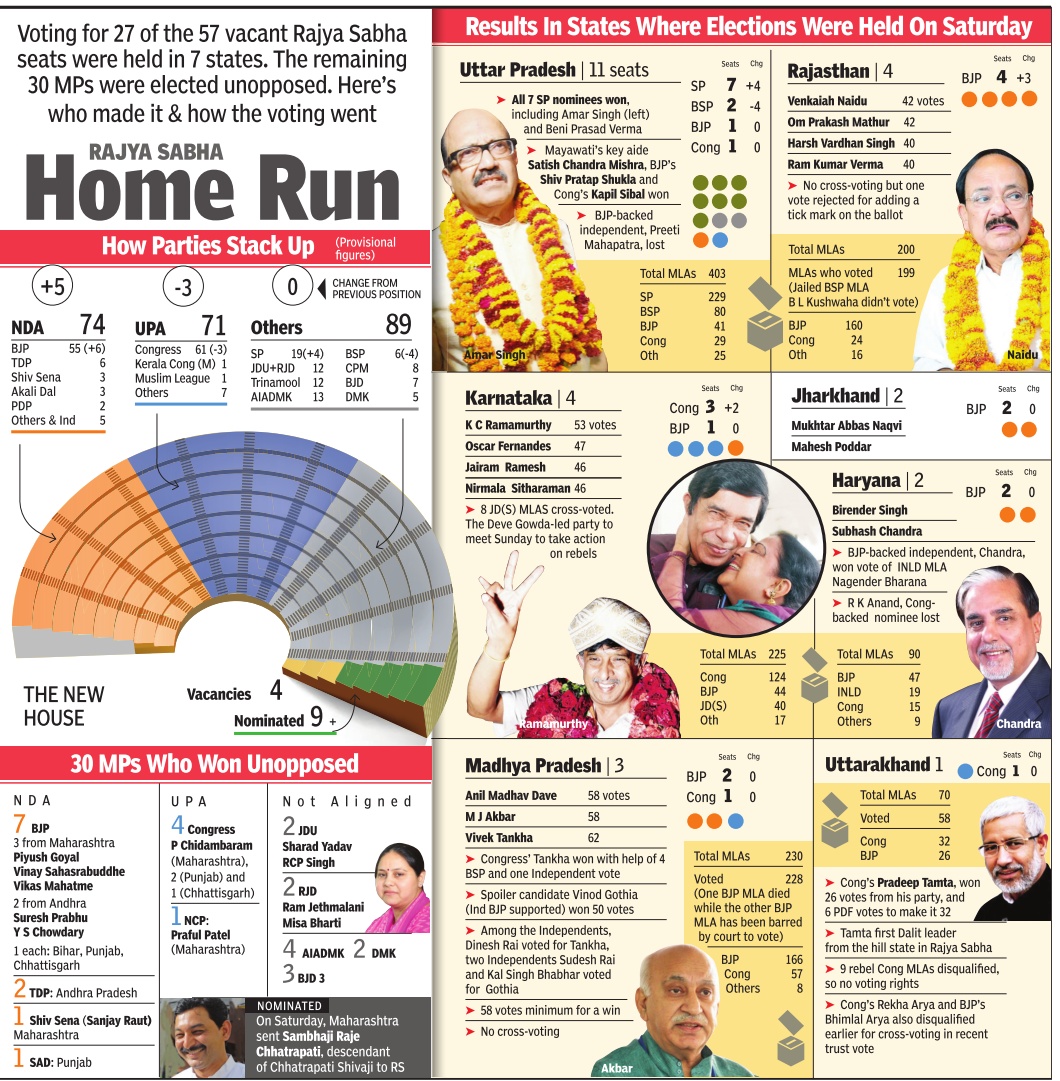
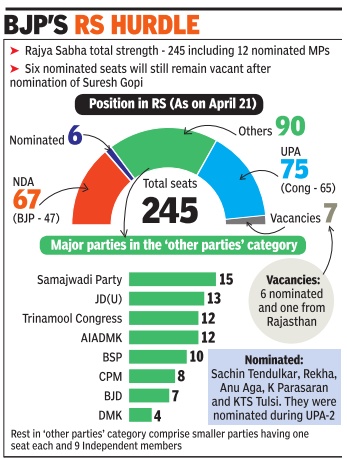
See graphics:
Results in states where elections were held in June 2016
Party Positions, June 2016
Party position in Rajya Sabha, as on 21 April 2016
2018
After bypoll losses, BJP grabs extra RS UP seat, March 24, 2018: The Times of India
March 24, 2018: The Times of India
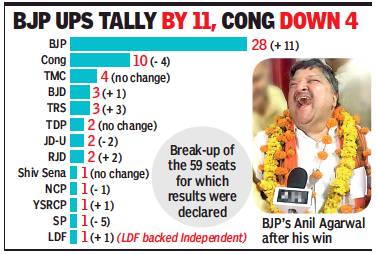
From: After bypoll losses, BJP grabs extra RS UP seat, March 24, 2018: The Times of India
HIGHLIGHTS
All nine BJP candidates from Uttar Pradesh won seats in the Rajya Sabha, thwarting the SP-BSP engine from gaining steam
BJP has won 27 of the 58 seats up for grabs in the Upper House, while the Congress won nine
Results of the two Rajya Sabha seats from Jharkhand are still awaited
Cross-Voting Setback For SP-BSP Bloc
Days after the sobering setbacks in two highprofile Lok Sabha bypolls in UP, BJP had reason to celebrate on Friday by defeating the SP-BSP combine in a high-voltage thriller for the tenth Rajya Sabha seat from the state.
With the results, BJP boosted its Rajya Sabha tally from 58 to 69 (winning 28 of the 59 seats for which results were declared). Congress won 10 seats, a loss of four seats from its current tally of 54.
BJP’s biggest gain was in UP, where, thanks to its landslide win in last year’s assembly polls, eight of its candidates, including finance minister Arun Jaitley, sailed through. SP had enough numbers to deliver the ninth seat to Jaya Bachchan.
RS poll: SP biggest loser, gets just one seat in UP
The last seat went right down to the wire before BJP’s Anil Agarwal prevailed over the joint candidate of SP and BSP, supported by Congress, in a contest marked by cross-voting.
BJP also improved its tally in Maharashtra, winning three of the six seats (a gain of two seats) and Rajasthan, where it won all the three seats (a gain of two). It also wrested from Congress a seat each in Uttarakhand and Haryana.
However, it lost two seats to Congress in Gujarat, where it could win only two of the four seats due to the Congress’s improved performance in the last assembly elections. It also lost a seat to Congress in Karnataka. Similarly, in Bihar too, it lost a seat to the opposition.
The 10th seat in UP became a bone of contention after a surprise pact between SP and BSP with the latter agreeing to back Akhilesh Yadav’s candidates in Gorakhpur and Phulpur LS by-polls in exchange for the transfer of surplus Samajwadi votes for Mayawati’s RS candidate.
Coming in the aftermath of the twin defeats in LS bypolls, the decision to make a run for the seat represented a considerable risk for BJP chief Amit Shah; also because a similarly audacious gambit to snatch the RS seat of Ahmed Patel had not worked last year in Gujarat. A second reverse would have not only raised questions about his high-risk “go-forjugular” style but, more importantly, would have helped SP-BSP amplify the perception of recovery in the wake of bypoll successes.
Agarwal’s victory was facilitated by cross-voting by BSP’s Anil Singh and SP rebel Nitin Agarwal, and Amit Shah’s success in netting the votes of two influential Brahmins from eastern UP — Vijay Mishra of Nishad Party and the controversial Independent Amanmani Tripathi. The gains helped the party make up for the loss of the vote of a BJP MLA who could not vote the right way, as well as the suspected switching over of support of two supporters of party’s inconsistent ally Om Prakash Rajbhar.
Though Agarwal received only 16 first preference votes against 33 notched by BSP’s Bhimrao Ambedkar, the saffron candidate went through because of BJP’s massive advantage in second preference votes, a factor that acquires critical importance in such fluid situations. The disqualification of the vote of a BSP MLA also helped.
Akhilesh did succeed in delivering all the ‘surplus’ SP votes, including that of his estranged uncle Shivpal Yadav, to BSP. Mayawati also ensured that there were, except for the case of Anil Singh, no desertions from the flock, which had in the past often proved to be vulnerable in similar circumstances.
RS elections in Karnataka were highlighted by drama with the JD(S) contingent resorting to a sit-in to protest an alleged nexus between the ruling Congress and the secretary of the Assembly, the Returning Officer, who had to be eventually substituted. The outcome, however, did not throw up any surprises, with Congress winning 3 seats and the remaining one going to BJP’s Rajeev Chandrashekhar.
In Jharkhand, while BJP’s Samir Oraon scored an easy win, the battle for the second seat witnessed a tough contest before Congress’s Tilak Sahu outmuscled BJP’s second candidate Pradeep Sonthalia in what was billed as a battle of resourceful rivals.
Among regional parties, SP was the biggest loser as it managed to win only one seat in UP (it held six of the 10 seats earlier). BSP, which had two of the 10 seats, failed to win a single seat this time.
TRS was the biggest winner among regional parties, winning all three seats from Telangana. In neighbouring Andhra, YSR Congress won one of the three seats, a gain of one seat. BJD won all the three seats in Odisha, an improvement of one seat.
Congress improved its tally from two to three in Karnataka, but it lost two seats each in Telangana and Rajasthan. The party also lost a seat in Maharashtra, where its ally NCP too lost a seat.
Passage of key bills easier for BJP now
Dipak Dash, BJP’s RS victory to make passage of key bills easier, March 25, 2018: The Times of India
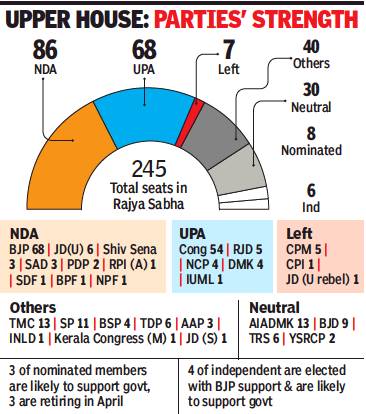
From: Dipak Dash, BJP’s RS victory to make passage of key bills easier, March 25, 2018: The Times of India
BJP’s growing numbers in Rajya Sabha, along with those of its allies, will help Modi government reduce the numerical disadvantage it suffers in the Upper House and, with the help of some regional parties, can put it in touching distance of the majority mark.
The shrinking gap, which will reduce further with the terms of three nominated MPs getting over soon, offers the government the opportunity to negotiate issue-based support from some non-NDA and non-UPA parties. Its support among independents and nominated MPs will add to its ability to get key bills passed.
The party has a majority on its own in Lok Sabha and with NDA partners, the number reached 315 in a House with a current strength of 540.
The tally of seats in Rajya Sabha after Friday’s results shows that the NDA can inch towards the halfway mark of 123 if it gets the support of regional parties such as AIADMK, TRS, YSR Congress and BJD. This can take the tally to 123 (with a few nominated and independent MPs). Though BJP is set to take on BJD in Odisha in the 2019 assembly election, the party has voted for key bills in the past. The data also show that there is still a big block of 115 members, including from UPA, Left and Trinamool Congress, who are unlikely to support the government on a bill where the opposition is rallying against the government.
The government will have the option of improving its strength by nominating new members in place of three who are retiring later next month. Three of the present nominated members are likely to support the government and four of independent MPs are likely to go with the treasury benches.
The government can also try to rope in former ally Indian National Lok Dal, which has just one member in the Upper House, if the issue is crucial enough even though the parties are opposed in Haryana.
While this is a good sign for BJP, which has been struggling in the Upper House since it assumed office in 2014, the stance of its allies after the SP wins in two Lok Sabha bypolls in UP need watching.
Perquisites, misuse of
2019: Railways travel facility
Only 15% of a bill of Rs 7.8 crore raised by the Indian Railways for the Rajya Sabha to pay for travel undertaken by MPs, their spouses and attendants in 2019 accounted for actual travel or journeys completed. The rest are cases of multiple bookings that were not utilised except for the purpose of claiming free travel.
A detailed assessment ordered by vice president and Rajya Sabha chairman M Venkaiah Naidu has resulted in shocking revelations. A former member of the upper house made 63 bookings — nearly 4 bookings every day for 23 days in January, 2019 totalling a whopping Rs 1.69 lakh — which was in contrast to only 7 train journeys he actually undertook, the fare for which was merely Rs 22,085. The Rajya Sabha Secretariat, however, was billed an extra amount of Rs 1.47 lakh for the MP’s tickets that he neither cancelled nor used. Similarly, a sitting member’s claim amounted to only 15% of the bills raised.
The audit conducted by officials of the upper House has led the Rajya Sabha secretariat to issue an unprecedented warning to MPs that they will be made to pay for train tickets that they book, but do not utilise or cancel.
The move, a part of Rajya Sabha’s measures to rein in wasteful expenditure and resultant inconvenience to public, comes into effect immediately. The Lok Sabha secretariat, sources said, has been served an even bigger bill of Rs 23.4 crore for travel undertaken by MPs in 2019. To monitor expenses better, the railways is likely to operationalise a change in software for train bookings by MPs of both Houses.
As part of their allowances, MPs are entitled to one free, non-transferable train journey in first class, air-conditioned or executive class for themselves, free travel by any railway in India with their spouse, if any, and one free airconditioned, two-tier class railway pass for one person to accompany the member when he or she travels by rail.
Question hour
Suspensions of; time spent on
Akhilesh Singh, September 4, 2020: The Times of India
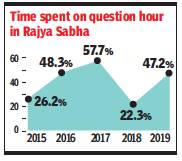
From: Akhilesh Singh, September 4, 2020: The Times of India
Opposition parties may be up in arms over suspension of question hour in the forthcoming monsoon session of Parliament but records show that over 60% of question hour’s time in Rajya Sabha in the last five years was wasted due to disruptions.
Besides, this is not the first time that question hour has been suspended. It had also been done on six previous occasions, the last time when Congress-led UPA was in office in 2009. “A reality check reveals that this spirit of commitment for question hour, given its importance as stated by the opposition, did not reflect in the House during the five year period of 2015-2019. As the ruling party has no majority in Rajya Sabha, opposition parties could not show the same spirit during proceedings in the House,” a senior BJP member said.
The research division of Rajya Sabha secretariat, at the behest of Chairman M Venkaiah Naidu, found that during 2015-19, only about 40% of the total question hour time was used to raise questions and obtain responses from the government. In the five-year period, Rajya Sabha held 332 sittings during which 332 hours were available for question hour at one hour per sitting. However, only 133 hours and 17 minutes were utilised to raise questions and obtain replies from ministers.
Moreover, records showed that question hour was done away with in 1962, 1975, 1976, 1991, 2004 and 2009 for various reasons. Sources said the decision to suspend question hour was taken after presiding officers of both Houses were informed by the parliamentary affairs ministry that the government had consulted political parties and there was a broad consensus. Only TMC was against the idea.
Government sources rejected the opposition’s charge that the session was too short, saying it was convened as per the constitutional provision. “The government wants members to stay in Delhi for a short period and once they perform their responsibilities, they can go back to their constituencies,” a senior member said. Moreover, the session is taking place for 18 days unlike some state assemblies which functioned for one, two and three days.
YEAR-WISE HIGHLIGHTS
2009-14 vis-à-vis 2014-19
RS lost over 95% of Budget session, February 14, 2019: The Times of India
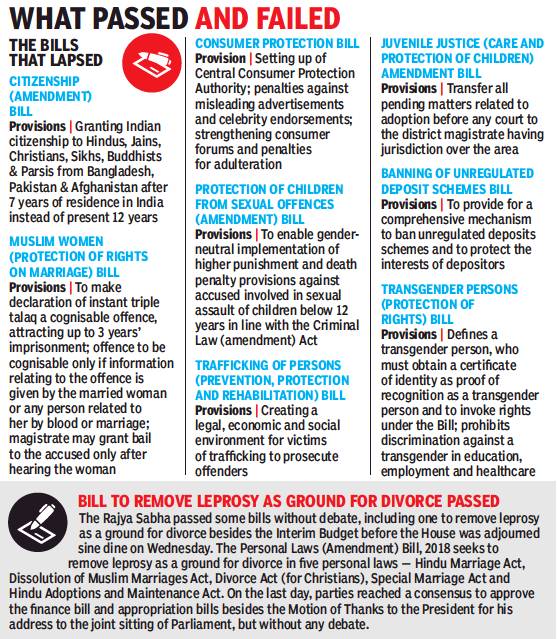
From: RS lost over 95% of Budget session, February 14, 2019: The Times of India
Chairman Naidu Laments Over Low Output Due To Disruptions
Slamming parliamentarians for frequent disruptions of the House, Rajya Sabha Chairman M Venkaiah Naidu said legislative output declined substantially since 2014 and the just concluded Budget session was a “wasted opportunity” with over 95% of time of the 10-day sitting lost.
“With a heavy heart I have to say that this short but important Budget session of Rajya Sabha turned out to be yet another wasted opportunity. This only reinforces the ‘dysfunctional pattern’ that has been evident over the last few years which is a matter of serious concern as it poses a serious threat to parliamentary democracy,” Naidu said in his customary remarks at the end of the session. During this session, productivity of the House has been 4.79%, he said. Rajya Sabha passed five bills during the Budget session, all of which were passed on the last day. Six bills have also been introduced and only 16 Zero Hour submissions were made. No special mention could be made at all.
Of the 18 sessions in the last five years, the productivity of Rajya Sabha was below 60% in eight sessions. One of the main reasons of low productivity of the Upper House was the belligerent attitude of the opposition, which was in majority since the government came to power.
As per official data, since June 2014 when the BJP-led government came to power, Rajya Sabha passed only 149 bills during 18 sessions and 329 sittings — less than a bill in two sittings. This compared to 188 bills passed during 2009-14 with less number of sittings, and 251 bills in 2004-2009.
Naidu said only one bill was passed in the winter session of 2016 and budget session of 2018, while the monsoon session of 2015 passed two bills. Maximum number of 14 bills each were passed during monsoon sessions of 2016 and 2018.
Declining productivity and legislative output is a matter of deep concern, Naidu said, citing pendency of large number of bills in the House. In last five sessions under his chairmanship, Rajya Sabha passed 28 bills — less than a bill in three sittings. He also said he has set up a two-member committee to examine existing provisions for their adequacy to enable smooth functioning of the House.
2014
Winter: 2014
RS completes only 21% of business during winter-2014 session
The Times of India Dec 21 2014
The logjam over the conversion row that has ensured little work was transacted in the Rajya Sabha this week which has brought down productivity in the House to a measly 21%. In comparison, Lok Sabha transacted 105% of the legislative business that was planned.
Analysis by PRS Legislative Research revealed that while Lok Sabha functioned smoothly during Question Hour with nearly 20 questions being answered in this week, Rajya Sabha functioned only 1% of the allotted time with only two questions being answered.
Despite the poor performance in the Upper House the Modi government has little choice but to cool its heels till 2016 when a significant number of opposition members—73---retire. Of the 241 members in the Rajya Sabha, 68 belong to Congress as compared to BJP's 42.
Rajya Sabha worked for 59% of winter session
Dec 24 2014
Himanshi Dhawan
The Rajya Sabha worked for 59% of the time. In 15 of the 22 days, less than three minutes were spent in responding to members' questions in the House. BJP’s low numbers in the RS have led to a near impasse in the last two weeks of the session in December, 2014.
2014-2020: Retirements
While 10 members each retire in the next two years, it is only in 2016 that there will be any dent in the opposition numbers. Among opposition members 21 Congress members, six from BSP, five from JD (U), three each from CPM and SP and two from NCP will retire in 2016. Three nominated and three independent members will also hang up their boots in the same year. Others who will retire include BJP and allies--12 from BJP, three from AIADMK, two each from TDP, Shiv Sena and SAD.
The highest number of MPs set to retire in the next two years is from Uttar Pradesh, including 10 this year, 11 in 2016 and 10 in 2018. After 2016 the highest number of retirees will be 2018 when 67 members of the RS are set to retire.
2018
Jan: finishes entire Zero Hour agenda, a record
January 2, 2018: The Times of India
The Rajya Sabha made a record of sorts as it took up all the Zero Hour issues and special mentions listed in the agenda for that period, Chairman M Venkaiah Naidu said.
"The Rajya Sabha today made a history. For the first time, all Zero Hour submissions, all special mentions were fully completed," said Naidu amid thumping of desks by members in the House of elders.
Naidu said this record depended on the cooperation of the members.
"Your cooperation is good, so my operation was very smooth...that's why the House was able to set this record," he said.
The Chairman expressed hope that in future too, the members would not waste time and stick to the schedule.
Before taking up the Question Hour, he also suggested that the ministers concerned should go through the Zero Hour submissions and special mentions and reply to the members at the earliest as it would enhance productivity of the House.
Uproarious scenes and adjournments have been witnessed on several occasions in the past two weeks due to various reasons during the ongoing Winter Session of Parliament.
In all, the House took up all the 10 listed and one additional Zero Hour submissions.
The members also paid obituary reference to a former member of the House, R Margabandu.
In his Zero Hour mention, Naresh Agrawal (SP) highlighted the "plight" of mediapersons, particularly those working at the district level.
He said there was a trend to hire correspondents on contractactual basis and there was no provision for pension or provident fund for them. Those working at the district level were paid according to the number of stories approved.
Agrawal said media supports the government and if a correspondent writes facts, pressure is built to get them removed.
The SP member also said nine prominent journalists, including Gauri Lankesh and Naveen Gupta, were killed.
He also alleged that mediapersons who were injured in the violence while covering court proceedings relating to self- styled preacher Ram Rahim in Panchkula were not paid for their hospital treatment.
Senior Congress member T Subbarami Reddy highlighted "frequent" close shave at various airports involving aircraft.
In his Special Mention, Motilal Vora (Congress) raised the issue of infant deaths in hospitals of Uttar Pradesh and Gujarat among others.
Other members who made Special Mentions included Ram Nath Thakur (JD-U), R Vaithilingam (AIADMK), Naryana Lal Panchariya (BJP) Husain Dalwai and Chhaya Verma (both Congress).
